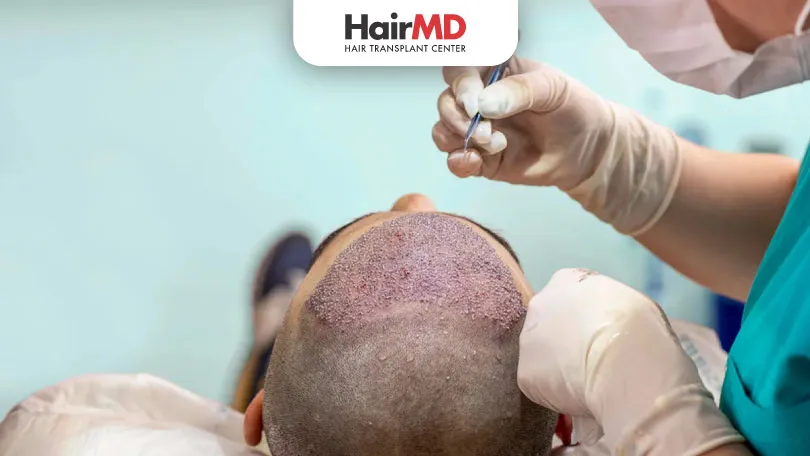31st May, 2022

Wondering if a hair transplant procedure is painful? Learn about the discomfort levels, pain management techniques, and what to expect during recovery.
Is shifting hair from one spot to another possible? Our hairs emerge from the hair follicles in the deeper dermis layer of the skin and are a constant source of confidence and self-esteem. However, several external and internal factors may make them fall out and lead to severe conditions like hair loss. To recover from the inevitable loss of hair, procedures like hair transplants may come in handy. Continue with the blog to know everything about the hair transplant procedure.
What’s covered in the article?
- What is Hair Transplant Procedure?
- Eligibility for Hair Transplant
- Does Hair Transplant Treatment Hurt?
- Conclusion
What is Hair Transplant Procedure?
Hair transplantation is a method in which the hair follicles from the side of the head is shifted to the bald portion of the head, especially the crown. Hair loss in the crown generally occurs due to androgenic alopecia or pattern baldness. In males, it is called male-pattern baldness, the formation of bald patches and receding of the hairline is observed. In females, this condition is referred to as female-pattern baldness, and hair starts to thin out mainly in the central partition area of the scalp. There are two types of hair transplant procedures follicular unit strip surgery and follicular unit extraction, which are performed based on the hair loss condition.
Eligibility for Hair Transplant
As the procedure involves the shifting of hair follicles from one side to another, the eligible candidates are:
Patients Suffering from Pattern Baldness
Men suffering from loss of hair from crowns and females with thinning hair are ideal candidates.
Burn or Scar on Scalp
Anyone with a burn or scar on the scalp which is not thick or fibrous.
Number of Donor Hair Sites
If the donor hair sites are enough and the hair loss is not widespread across the scalp. Non-eligible candidates are people suffering from the following:
Hair Loss Due to Chemotherapy or Radiations
Patients undergoing chemotherapy and radiation are not eligible for the treatment.
Lack of Donor Sites
If the donor sites are not enough, the candidate is not eligible.
Severe Burn on Scalp
A person with a thick scar filled with fibrous tissue is also non-eligible for the transplant.
Does Hair Transplant Treatment Hurt?
Hair transplant treatment is performed by a surgeon or an expert dermatologist in the clinic. Some people have hair transplant phobia and fear the needles used in incisions. The treatment does not hurt as it involves the use of anesthesia. The patient is injected with the local drug before the incision and beginning of the transplant to minimize pain. During the procedure, the hair doctor performs the procedure and takes out the hair follicles from the sides and back, which are put at the sites of hair loss.
You may encounter pain upon completion of the procedure, and thus anti-inflammatory, pain relievers and antibiotic medicines are prescribed to reduce the chances of infection, swelling and pain. If you suffer from excessive bleeding, infection or inflammation on the scalp upon completion of the treatment, consult the dermatologist right away.
Are you suffering from excessive hair loss? Book your consultation with HairMD to get a hair transplant. Our experienced dermatologist will explain the hair transplant procedure and ensure a painless treatment.
Do You Know?
Nearly 250 Patients Visit HairMD
Everyday For Various Hair Concerns?
(Your journey to healthier and fuller hair starts here!)
Meet Our Dermatologists
Conclusion
In conclusion, a hair transplant procedure typically involves minimal discomfort due to local anesthesia and modern techniques. Any mild pain or soreness experienced during recovery is temporary and can be managed with prescribed medications. If you’re considering a hair transplant, it’s important to discuss pain management options with your surgeon to ensure a comfortable experience and smooth recovery.
Further Reading
Top Kitchen Ingredients to Boost Hair Growth
Discover the best kitchen ingredients for hair growth! Use coconut oil, onion juice, aloe vera & more to nourish your hair naturally and reduce hair fall.
How to Treat Alopecia Areata at Home: Natural Solutions for Hair Growth
Explore home remedies for alopecia areata to promote hair regrowth and boost confidence from home.
Redensyl vs. Minoxidil: Which is the Better For Hair Growth?
Discover the differences between Redensyl and Minoxidil for hair growth. Learn about their effectiveness, side effects, and which treatment might be better for you.
Biotin-Rich Foods for Natural Hair Growth
Know the best foods rich in biotin to help your hair to grow naturally stronger and healthier by experts from HairMD, Pune
Have thoughts? Please let us know
We are committed not only to treating you, but also educating you.











